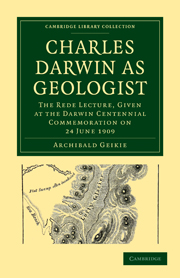 Charles Darwin as Geologist
Charles Darwin as Geologist Book contents
CHARLES DARWIN AS GEOLOGIST
Published online by Cambridge University Press: 07 September 2010
Summary
When the Vice-Chancellor honoured me with his invitation to give the Rede Lecture this year, he informed me that it would be included in the proceedings of the present Celebration. Although he left me free in the choice of a subject, it was obvious that the lecturer could hardly hesitate to select a theme which would have reference, more or less direct, to the illustrious Naturalist whose Centenary the University had resolved to commemorate. The nature and extent of Charles Darwin's contributions to biological science have been so often and so fully described, and his influence on almost all departments of human thought has been so amply recognised, that for the present, little more may seem to remain to be said on the subject until, in the course of time, a fresh review of his relations to the history of intellectual development may be called for. Nevertheless, I venture to think that there is one branch of his scientific labours, the value and significance of which have scarcely perhaps received the notice and appreciation to which they are entitled. It is apt to be forgotten that Darwin began his active scientific career as a geologist, that it was mainly to geological problems that the earlier years of his life were devoted, and that it was in no small measure from the side of geology that he was led into those evolutional studies which have given him so just a title to our admiration and gratitude, and have placed him so high among the immortals.
- Type
- Chapter
- Information
- Charles Darwin as GeologistThe Rede Lecture, Given at the Darwin Centennial Commemoration on 24 June 1909, pp. 1 - 64Publisher: Cambridge University PressPrint publication year: 2009First published in: 1909


